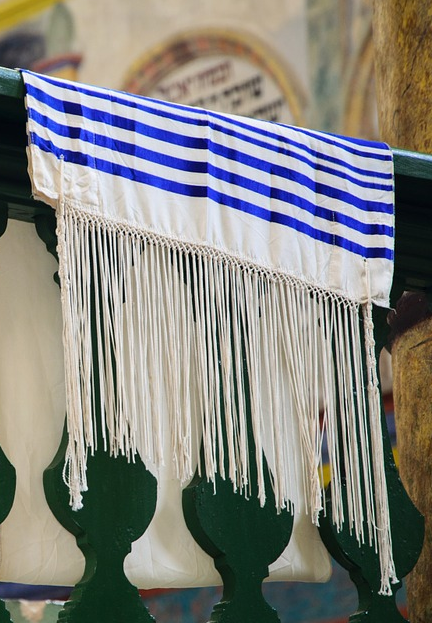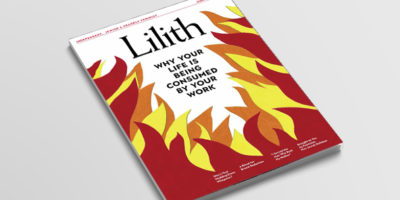
Calling Out Her Name
The Paradox of Personal vs. Public prayer
A hush sweeps over the sanctuary as Rabbi Jaffe begins to walk amongst us. His voice, usually booming yet warm in tenor, drops to a near-whisper as he says it’s time to remember those in need of healing. “If you have their permission, say their name when my eyes meet yours,” he says. Rabbi Jaffe moves so quietly on the beige carpet that I hear each exhale of his breath and mine. His is even, calm. Mine is erratic, uneasy. He pauses in front of a row of chairs, gazes at one person, then waits for five seconds or more before moving his eyes to the next.
I ache to say Mom’s name as Rabbi Jaffe’s bespectacled eyes meet mine. But I cannot. I look beyond him and stare at the flickering flames of the candles lit for the Shabbat service. Soon the duet of white candles will melt into nothingness. I lean closer to my husband Pavlik and Simon, our son. I have never asked Mom for permission to say her name at services, though several years have passed since she was diagnosed with Parkinson’s disease. I do not ask even as her voice starts to fail. I do not ask when she develops spinal stenosis and her legs hurt so badly that she weeps in pain one morning as we eat breakfast at my parents’ home in South Carolina. I do not ask though I would do anything to make life easier for her. I sit with Mom, my cereal bowl long emptied, as she spoons tiny portions of Raisin Bran into her mouth and tries to swallow. Soon, she takes an oval pill from a handful of pills in front of her and sets it on her tongue. She sips water from a straw. Several minutes go by. The pill is still perched on her tongue.
I envy the congregants who confidently meet our rabbi’s gaze and declare the name of a parent, sibling, child or friend. They have the courage I lack. But when we begin singing Mi Shebeirach, a prayer of healing, I let my soprano voice soar loudly above the chorus of voices in the high-ceilinged room. “May the Source of strength Who blessed the ones before us help us find the courage to make our lives a blessing, and let us say, ‘Amen’.” Why can I sing this prayer but not say Mom’s name?
In the past, I might have blamed my apathy to religion for my reluctance to participate too publicly in prayer, but I am in a different place now. In my early 40s, I studied Hebrew for a few years, then chanted from the Torah as an adult in a bat mitzvah ceremony. Mom, born in the 1930s when most Jewish girls did not formally mark a bat mitzvah, cheered me on. During my ceremony, Mom draped a prayer shawl, a tallit, around my shoulders. Painted on the shawl was Miriam shaking a timbrel, dancing, singing during the exodus from Egypt. Mom and I picked out the tallit together, liking the symbolism of Miriam, a strong Jewish woman who led her frightened people in song.
Mom has always been my Miriam. At 20, she married Dad before she finished college. She continued her studies while raising me and my two older brothers and graduated from college when I was in preschool. She led organizations of women throughout my childhood. When I was in junior high, she helped direct a college program that provided English instruction to students from around the world. During this prayer of healing, I can sing in a now almost instinctual act of prayer. But I shy away from letting Mom’s name ring out in the high-ceiling sanctuary, shy away from admitting that she is fading a little more each time I see her.
At Thanksgiving, when I visit my parents, Mom rolls up a pant leg to show me fresh bruises on her knees. She has gone from using a cane to a walker. But she still has to reach for things. She still has to let go. She never knows when she might fall because that’s the cruelty of Parkinson’s, the never knowing. She reluctantly gives up the idea of making Thanksgiving dinner. I offer to cook, but Dad refuses my offer before Mom can speak up.
“No, let’s just go out,” Dad says, his voice rising when he senses my resistance.
“Dad, I can do it. I’ve done it before. It’s no problem, really,” I say, knowing that Mom, given a choice, would prefer to eat in her own dining room with a view of her orchids and the lake from a wall of windows. Home is more intimate.
“No,” Dad says. I push no further. We eat at the country club restaurant in my parents’ development, loading our plates from a buffet with turkey, beef, fish, sweet potatoes of different varieties, a buffet with too many choices and too many people.
The next evening, I just nod when Dad suggests we go to Ruby Tuesday’s. I sit next to Mom, who orders baby back ribs smothered in barbecue sauce. I want to suggest something healthier. But I stay silent and remember what my aunt told me the last time I fretted about Mom’s penchant for fatty foods, for cookies, for hot fudge sundaes, a craving which increases as her Parkinson’s symptoms multiply. “Let her eat what she wants. It’s a simple pleasure,” my aunt says. It dawns on me, too, that Mom can eat the ribs unassisted, with her hands. The ribs are as billed, so tender that the meat falls off the bones. Usually, Mom relies on Dad to cut her food. The ribs give her independence.
Mom and I chat about the year ahead and her desire to see us many times more. She wants to live closer so she can spend more time with Simon. I strain to hear her and scoot my chair closer.
Across from us, Simon, who is six, lists his favorite Pokémon characters to my brother Steve and Dad, who have no idea who Pikachu is. Pavlik listens goodnaturedly to the Pokémon dissertation. Mom licks her fingers after finishing the ribs, and I start to talk to her about something. I don’t remember what. But I will never forget this. She does not answer me.
“Mom?” I say. Her eyes are closed.
“Mom, are you OK?”
My stomach tightens. Dad touches Mom’s arm and gently shakes her. “Dorothy,” he says, pleading in his bass voice. “Come on, sweetie.”
Mom does not answer. Her head droops.
I am afraid of losing her when she wants to be present for so much, when I want her there, too. I’m a latecomer to marriage and to motherhood. I married Pavlik when I was 42. I had Simon when I was 43. I gave Mom her only grandchild. But tonight, she has talked about wanting more, more simple pleasures that should be easy to grant. She wants to sit in the audience when Simon has a piano recital or when he skates his first solo. Mom’s own mother lived to 102. Why can’t longevity be 100 percent hereditary?
“Mom,” I say, my eyes welling. I look at Pavlik who already is pulling his cell phone out of his shirt pocket to call 911. I married a Boy Scout, though he was never in a troop. He carries band-aids everywhere. A band-aid will not fix this.
I notice Simon, his eyes wide. My brother Steve looks unsure of what to do. I decide. “Steve, would you take Simon to the lobby?” I do not want Simon to see an emergency crew trying to rouse Mom. If death is looming, Simon does not have to bear witness.
“Mrs. Wertheimer, can you hear me?” a paramedic asks as he wraps a blood-pressure cuff around my mother’s arm.
Mom, her eyes still shut, makes an unintelligible grunt. I exhale the breath I do not know I am sucking in. The emergency crew puts Mom on a stretcher and takes her to an ambulance outside. At the hospital, a doctor tells us it is possible Mom had a tiny stroke. He asks her to give her age. She easily answers. She is 78. The doctor says she can stay overnight as a precaution. My father wants to take her home. I want her to stay. The decision is not mine to make. “I want to go home,” Mom says, drawing out each word slowly.
The next week, I am back at my house in suburban Boston, calling Mom to check on her and just to talk.
“Mom,” I ask, “Can I say your name at temple during the prayer for healing?”
“Of course,” she says, surprising me with her fast response. Granting me permission seems like her acceptance of what she faces. When Parkinson’s first appears in Mom’s life, she can cloak evidence of hand tremors and other symptoms with medication. She tells me she does not want her fellow bridge players to find out, though she finds it harder to hold the cards. But as the disease progresses, Mom becomes more open about having Parkinson’s. She has fewer good periods each day. During the bad periods, which can last for several hours, she sits in a chair, lethargic. We talk about her coming to visit in a few months. She says she cannot make promises. Maybe I am the one who has been in denial most of all.
At Shabbat that week, my rabbi starts his stroll in front of the sanctuary rows. I hold Pavlik’s hand as Rabbi Jaffe’s eyes connect with mine. I gently voice the name of the woman I love so much, the person in need of healing. “My mother, Dorothy Wertheimer.” Comfort sometimes can come in the smallest of forms, in the uttering of a name.
Linda K. Wertheimer, a veteran journalist and former Boston Globe education editor, is the award-winning author of Faith Ed, Teaching About Religion In An Age of Intolerance.


